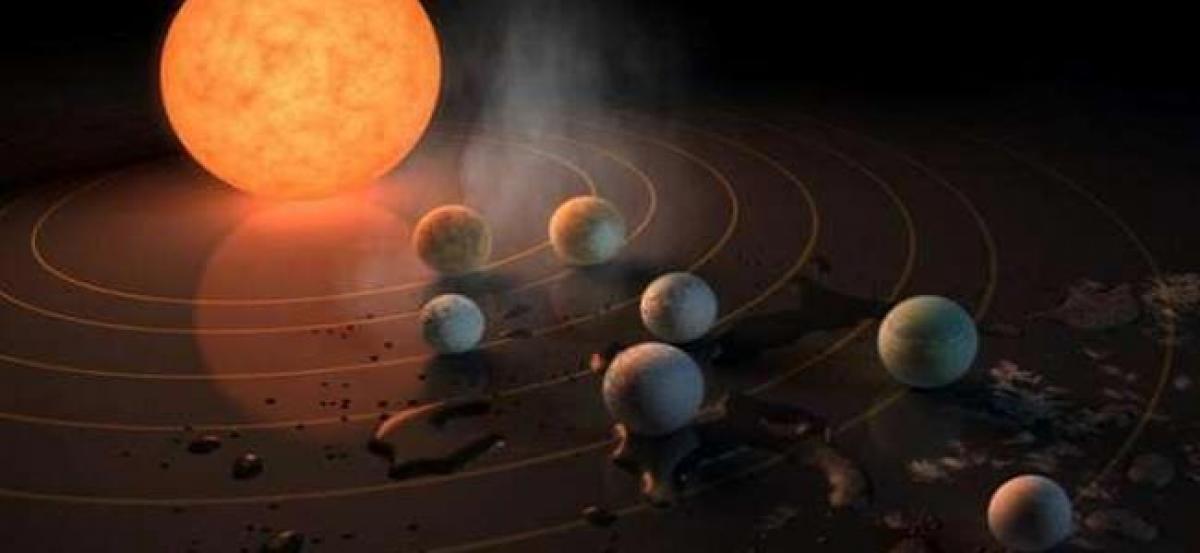Live
- Allu Arjun Seeks Lunch Motion; Court Hearing Scheduled for 2 PM Today
- Vijayawada hosts Swarnandhra Vision-2047 Program to foster development in AP
- World Bank okays loan for new project to boost earnings of UP farmers
- Zomato gets GST tax demand notice of Rs 803 crore
- Atul Subhash suicide: No arrests made yet, says Bengaluru Police Commissioner
- Indian agrochemicals sector to see 7-9 pc growth next fiscal: Report
- SC refers to CJI Cong leader’s petition for verification of EVMs used in Haryana polls
- To become the youngest world champion is truly a great feat: Gill congratulates Gukesh
- Case Filed Against Allu Arjun Under Four Sections
- Remembering A Visionary Leader.
Just In

Veteran space scientist K Kasturirangan has said decades of space research have only touched the tip of the iceberg understanding various planets, and continuous exploration of the solar system would throw light on possible options for humans to settle down.
Hyderabad: Veteran space scientist K Kasturirangan has said decades of space research have only touched the tip of the iceberg understanding various planets, and continuous exploration of the solar system would throw light on possible options for humans to settle down.
The former Chairman of Indian Space Research Organisation (ISRO) also said that establishing a human colony on the Moon is certainly possible that can have objective to explore and exploit resources.
"As a human colony (on lunar surface)...certainly this is possible but as a permanent place for human habitation...one has to evaluate it after the initial exploration part of it," Kasturirangan told PTI.
"There are for example...Chandrayaan-1 (India's moon mission) has looked at a 10-km tunnel (on Moon) which looks to be a very nice way in which human beings....after all these developments for centuries, will go back into caves. That's possible. So, I can't say anything about this at this stage," he said.
The former Secretary in Department of Space and ex-Chairman of Space Commission, said issues of sustainability are yet to be evaluated on the matter of permanently setting down on Moon.
"That's exactly why you want to explore some more objects in the solar system to evaluate that sustainability," he said.
On reports that a mission to Venus is on the drawing board of ISRO, Kasturirangan said, "If that is there, it's great. Solar system is a system on which we have not made much progress and understand...50 to 60 years of space research by itself has only touched the tip of the iceberg understanding the various planets."
Any exploration of the planet gives one an insight into origin and evolution of the solar system, he noted.
"Secondly, this (exploration in general) is to look at some of the planets in respect to long term survivability of human kind," he added.
"Currently, human kind has originated and evolved on the Earth. Can this be a single point of habitation for the human kind? or do we need to have other options in the solar system, so that there is no single point catastrophe that can destroy the society or human kind due to some unexpected reasons...it could be related to meteoric impacts or it could be local problems like virus and things of that kind," he said.
Kasturirangan said exploration of the solar system is a human imperative of the future.
"How we want to explore this and what kind of planets should come in the agenda are a matter of choice between scientists and other strategic thinkers. And I think that's what ISRO is currently doing," he said.

© 2024 Hyderabad Media House Limited/The Hans India. All rights reserved. Powered by hocalwire.com







